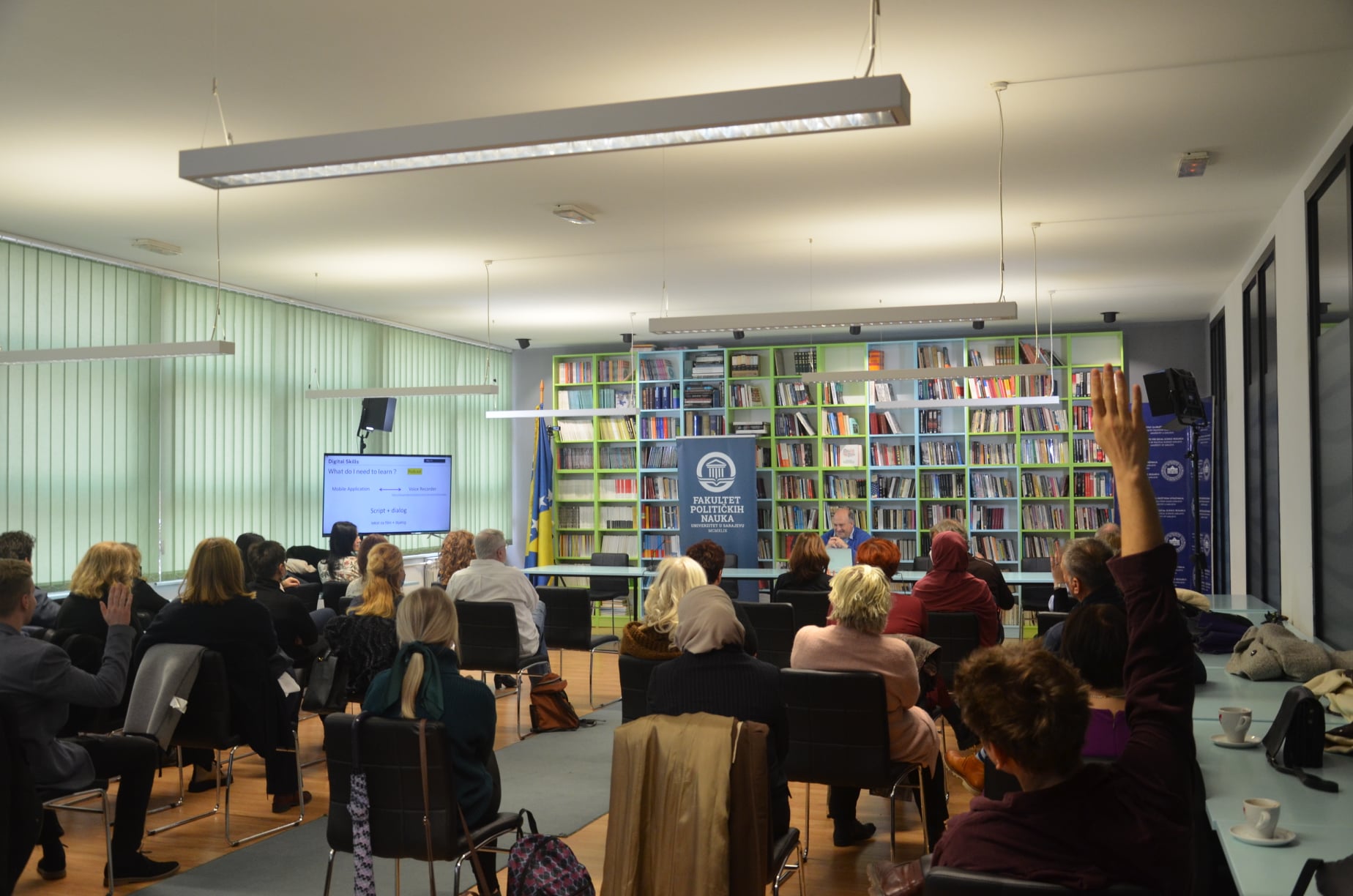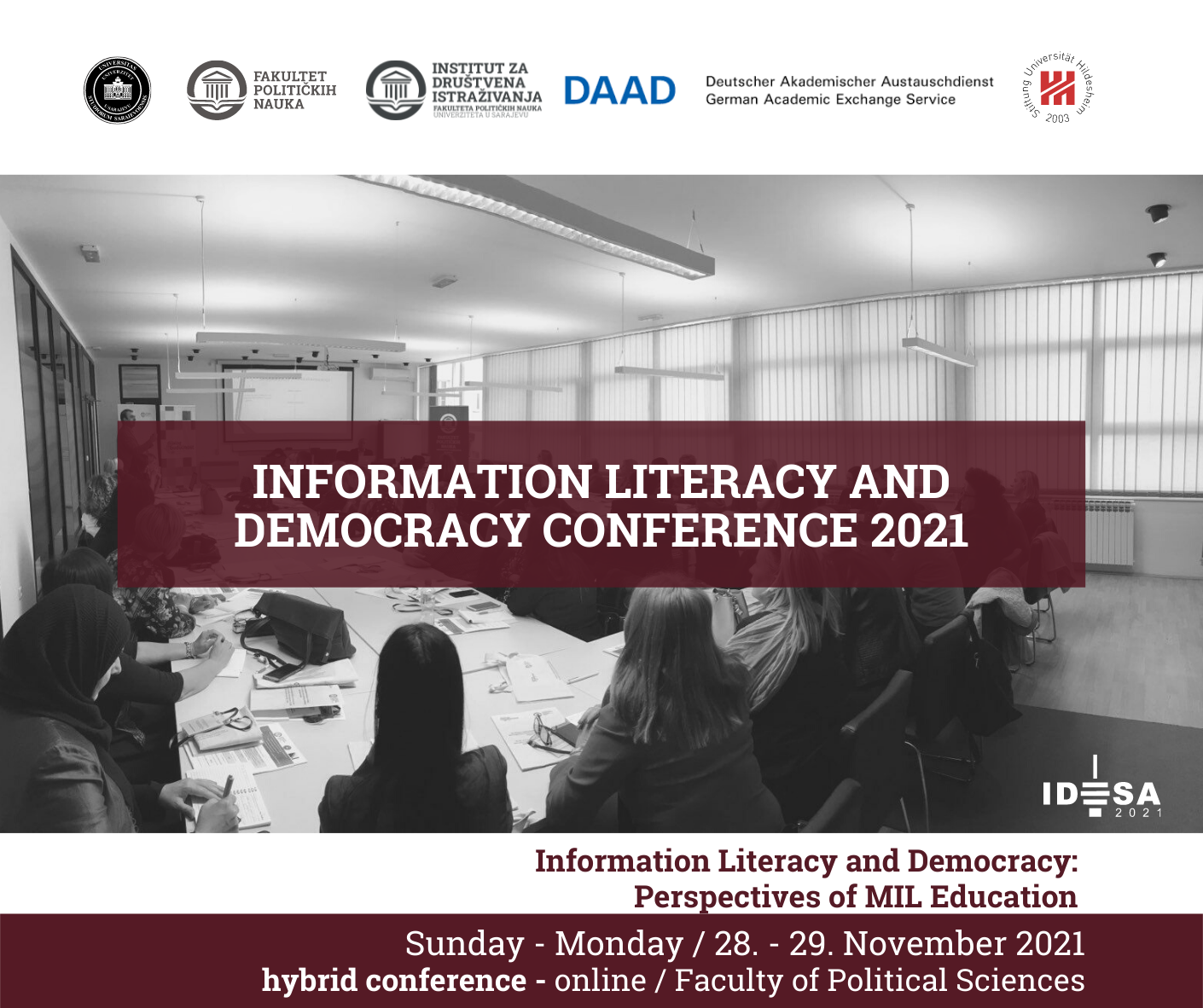At the first online IDESA Conference held on 4th December 2020 in Sarajevo, which highlighted various aspects of information and media literacy with particular emphasis on the role of information professional for civic development in Bosnia and Herzegovina, this year’s, second hybrid (online) IDESA 2021 was held on 28th and 29 November 2021 in Sarajevo / Faculty of Political Sciences, University of Sarajevo.
IDESA 2021 – INFORMATION LITERACY AND DEMOCRACY: PERSPECTIVES OF MIL EDUCATION introduced various aspects of media and information literacy, different approaches, and practices but also to articulate perspectives for the further development of digital learning.
It goes along with ongoing discussions and activities hosted by Institute of Social Science Research of the Faculty of Political Sciences (University of Sarajevo) that in cooperation with the University of Hildesheim (Germany) follow joint efforts to engage in wider academic discourses for the benefit of fostering democratization of learning processes.
Since the Institute of Social Science Research has recently developed and published a series of documents and books for the integration of MIL curricula in schools, this conference has served as capacity building forum for educators, teachers, librarians, academics, information professionals, students etc. especially those who are focused on transferring MIL knowledge and skills.
The second of its kind in a row, the Information Literacy and Democracy Conference (IDESA 2021), was held from the 28th until the 29th of November at the Faculty of Political Sciences, hosting 53 participants from Germany, the United States, France, Croatia, Serbia, and Bosnia and Herzegovina. The first day of the IDESA conference was organized as the last lecture within the existing two-month training program of librarians for media and information literacy, organized as part of the EU-UNESCO funded Project “Building Trust in Media in South East Europe and Turkey – Phase 2”. The Institute of Social Science Research recognizes the role of librarians in cooperation with teachers and other actors in the educational process as a central place for the development and promotion of media and information literacy. Therefore, the training program’s goal was to strengthen the library community in the long run, guided by the profession’s ethical principles while using the possibilities of digital technologies and open educational resources. This starting point assumes that school librarians can and should be the bearers of inter-professional partnership within the school community.
In addition to the keynote lecture “Multimedia in Education” by Juanjo Bote from the University of Barcelona, the participants on the first day of the IDESA conference also attended the lectures by Martina Dragija Ivanović and Saša Madacki. They shared years of experience and advice from the library profession with librarians in the reading room and through the Zoom platform. Finally, at the expert meeting and concluding remarks, school librarians had the opportunity to present their observations on the training program and make suggestions to the Steering Committee on promoting and developing media and information literacy in schools. The first day of the IDESA conference ended with the awarding of certificates to 36 librarians from Republika Srpska, Herzegovina-Neretva Canton, and Sarajevo Canton who completed the training program, Massive Open Online Course (MOOC) and actively participated throughout the process.
The second day offered an insight into the perspectives of digital education of the world’s speakers and those from the countries of Former Yugoslavia. This meeting also served to showcase previous achievements in the field of media and information literacy. Srećko Jelušić spoke about the book “Media and Information Literacy: Learning Design for Digital Age,” Ph.D. candidate Sanel Huskić on MIL Strategy in Canton Sarajevo, while Joachim Griesbaum and Theresia Woltermann presented an insight into the transnational online course in media and information literacy.
Wolf Schünemann, University of Hildesheim, Milijana Mićunović and Kristina Feldvari, University of Osijek commented on the relationship between active, information literate citizens and the democratization of society. Demonstrating the possibilities of combining coding, digital art, and data visualization, Uroš Krčadinac from the Faculty of Media and Communications in Belgrade spoke about creative coding in high schools.
UNESCO’s program specialist from Paris, Alton Grizzle, was a special guest speaker presenting the publication “Media and Information Literate Citizens: Thinking Critically, Click Wisely”. One segment of the book “Media and Information Literacy: Learning Design for Digital Age” (2021), published by the Faculty of Political Science, University of Sarajevo, starts from the adapted and regionally contextualized UNESCO MIL training modules listed in the first edition of “Media and Information Literacy Curriculum for Teachers“ (2011). Based on previous joint activities and cooperation, the conference hosts exchanged experiences and examples of good practices with Grizzle as the Section for Media and Information Literacy and Media Development representative.
Keynote speakers of the closing day were Tom Mackey and Trudy Jacobson from SUNY – State University of New York, presenting the concept of metaliteracy as an innovative, collaborative and open online learning environment: metaliteracy indeed represents a modification of the traditional approach to information literacy by recognizing other related types of literacy and critical thinking in the digital age.

Gallery »

